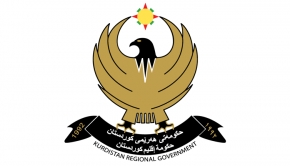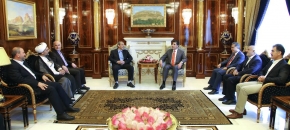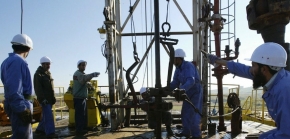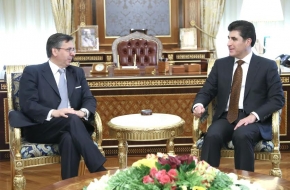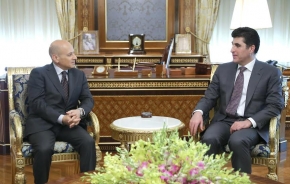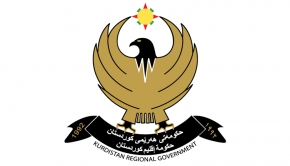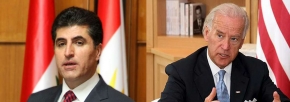Without a significant increase in funding from the International Community and financial transactions from Government of Iraq, the Kurdistan Region will not be able to contain the humanitarian crisis.
The Kurdistan Regional Government has long adopted an inclusive and welcoming policy free of discrimination based on religious, cultural, ethnic or political identity. We recognize the vital importance of aiding those that are fleeing violence and unrest from other parts of Iraq in order to establish and maintain peace in this conflict-ridden area.
Kurdistan Region as a Safe Haven
From 2003 up until 2013, KRI opened its doors to more than 600,000 internally displaced Iraqis. The Government and the people of the Kurdistan Region understood that sustainable peace and development cannot be accomplished if some members of society are marginalized, and so we championed for inclusiveness by ensuring that these new members of our society were granted the same rights, protections and access to services.
Today, the Syrian civil war has produced one of the largest displacement crisis in the world and a significant number of Syrians fleeing violence have sought safety and shelter in the Kurdistan Region. In a sudden escalation of violence, the brutal invasion of the Islamic State in 2014 resulted in the forced displacement of three million Iraqis. The situation has rapidly developed into a full scale level-three humanitarian crisis. Offering protection and shelter, the Kurdistan Region once again became a safe haven for more than half of the displaced population and we have continued to keep our borders open.
Today, the Kurdistan Region is offering safety, protection and services to 280,000 Syrian refugees and up to 1.5 million IDPs. In 2014, an average of 80,000 IDPs entered the Kurdistan Region every month. These figures exclude the displaced populations served by the KRG in the neighboring provinces. As a result of multiple waves of displacement, the population of the Kurdistan Region has increased by almost 30%, placing immense pressure on existing resources and services. While the nature of the crisis challenges our ability to collect exact displacement figures, the number is significant enough to raise acute emergency alarms.
Containing an Extended Level-Three Crisis
The Government of Iraq has unconstitutionally withheld KRG’s 17% share of the annual budget for the past 17 months. This has crippled the KRG’s ability to maintain public services for the local population and meet the basic needs of the IDPs. Confronted with the trifecta of crises – loss of 90% of the fiscal transfers, the refugee and IDP crises and the war on ISIS – KRG cannot maintain its level of contribution and open-door policy without putting the safety and welfare of the population and stability of the Region at risk. Whilst the initial consequences are apparent, the full scale of the impacts is still unfolding due to the on-going nature and magnitude of the conflict. Up to date, the KRG has managed to contain the crisis and meet the basic needs of the affected populations with the assistance of UN Agencies and national and international NGOs. Yet the heaviest burden has been borne by the host communities, whose living standards, access to services and opportunities have drastically deteriorated over the past few years. Regrettably, the GoI has remained largely absent in the response to the IDP crisis in the Kurdistan Region despite its constitutional duty to its displaced citizens.
Contingency and Preparedness
In one of the world’s most complex humanitarian crisis, the KRG and humanitarian partners on the ground are challenged to meet the deepening needs of a population in protracted displacement, while also responding to new emergencies and influxes. The military operations and subsequent displacements from Anbar have offered an insight into the likely outcomes of the anticipated liberation of Mosul. The worst case scenario is warning of the displacement of one million people. Based on previous displacement trends, geographic proximity, safety and security in the Kurdistan Region and the restricted access policies of other provinces in Iraq, the majority of the new IDPs will more than likely flee to the Kurdistan Region.
Preventing Regional Collapse
Over the past years, the refugee and IDP response plans have remained chronically underfunded. At its conclusion, the Strategic Response Plan had been funded at 26% while the corresponding figure for the Refugee Response stands at an alarming 19%. Adding to this pressured funding situation, the GoI has not only lacked in providing assistance but has also withheld KRGs share of the national budget. In the recently launched Humanitarian Response Plan (HRP), the humanitarian community has appealed for $500 million. If funded, the HRP will alleviate acute suffering but fall short of tackling the impact on host communities and society at large. A recent report published by the World Bank and the Ministry of Planning estimates the cost of stabilising the region back to the pre-crisis level at $1.4 billion under the baseline scenario, in which no new influx of displaced populations enter the Kurdistan Region. In the worst-case scenario, the World Bank and MoP have estimated a staggering need of $2.4 billion for stabilization costs. It is the regrettable conclusion of the KRG that without a drastic increase in funding from the international community and financial transactions from the GoI, the Region will neither be able to cope with the current crisis, nor respond to anticipated new displacements. As humanitarian partners formulate contingency plans, it is paramount to recognize that the Kurdistan Region has exhausted its response and absorption capacity and is at risk of total collapse. KRG remains committed to its humanitarian responsibilities and will continue to voice the plight of the women, men and children in distress. We are calling on the international community and the GoI to provide the region with the necessary resources and technical support to continue offering a safe haven to those in need.
Erbil, Kurdistan Region, Iraq (dfr.gov.krd) - The Chief of Staff to the Kurdistan Region President, Dr Fuad Hussein, and the Head of the Department of Foreign Relations, Minister Falah Mustafa, today briefed diplomats and representatives of international organizations on the latest security, humanitarian and political developments.
Minister Mustafa thanked diplomats for attending the session and for their confidence in the stability and security of the Kurdistan Region. He gave an overview of the security, humanitarian and political developments in the Kurdistan Region.
The Minister expressed appreciation of the people of Kurdistan Region to the members of the Counter-ISIS Coalition for supporting Kurdistan Region in the fight against international terrorism. He also thanked members of the international community, UN agencies and international organizations for providing humanitarian assistance to the refugees and displaced people who have fled to the safety of the Kurdistan Region.
Dr. Fuad Hussein, Chief of Staff to the President, briefed the diplomats on the political and legal challenges facing the issue of the presidency of Kurdistan Region. He announced “We are taking the legal and political challenges pertaining to the issue of presidency very seriously. The five major political parties are engaged in lengthy negotiations to reach a consensus on that matter.”
“We are a democracy in the making. Our political parties have chosen to resolve their differences through dialogue and negotiation. We consider this as a very positive development in the democratic process of the Kurdistan Region,” the Chief of Staff to the President added.
During the meeting several diplomats reiterated their support for the Kurdistan Region and praised democratic maturity of Kurdish political parties.
On behalf of the diplomatic corps, the Consul General of Palestine, who serves as the dean of the diplomats, Nazmi Hazouri, thanked the DFR for the briefing and highlighted the importance of a united and strong Kurdistan Region for the regional peace and stability.
Consul General of the Republic of France, Alain Guépratte, conveyed “The French authorities are closely monitoring developments in the Kurdistan Region. We have confidence in the Kurdistan Region and we fully support the region’s effort to overcome the current challenges. We believe that the political parties will be able to reach a consensus on the issue of the presidency of the Kurdistan Region.”
Head of the Consular office of the Republic of Italy, Carmelo Ficarra, stated, “Italy shares the same sentiment of France towards Kurdistan Region. Italy believes in the stability and security of the Kurdistan Region and it will continue to support the region in all fronts.”
Head of the UNAMI Regional Office in Erbil, Sokol Kondi, expressed the support of the United Nations to the stability of the Kurdistan Region. “Political differences need to be resolved through dialogue and negotiation. I commend the Kurdish political parties for seeking democratic tools to reach an agreement on the issue of Presidency of the Kurdistan Region, this is a positive step forward in the democratic process of this region,” he added.
Several other diplomats including representatives of UK, Iran and Kuwait exchanged thoughts on the developments in the Kurdistan Region.
The meeting was attended by representatives of Palestine, Republic of France, United Arab Emirates, Republic of Turkey, People’s Republic of China, United Kingdom, Republic of Italy, Republic of South Korea, Federal Republic of Germany, Republic of Romania, Islamic Republic of Iran, Russian Federation, Republic of Hungary, Hashemite Kingdom of Jordan, State of Kuwait, Kingdom of Netherlands, Arab Republic of Egypt, United States of America, Czech Republic, Canada, Republic of Bulgaria, Republic of Sudan and UNAMI.
Erbil, Kurdistan Region, Iraq (cabinet.gov.krd) - Kurdistan Region Prime Minister, Nechirvan Barzani, yesterday received Hassan Danaei-Far, Ambassador of the Islamic Republic of Iran in Iraq and his accompanying delegation.
Ambassador Danaei-Far valued Kurdistan Region for its continuous progress and development, successful campaigns against the Islamic State terrorist organisation, ISIS, and resistance to the economic difficulties which the Region faces, as well as the Region’s ability to accommodate a significant number of refugees and internally displaced people.
He reiterated his country’s support for the Kurdistan Regional Government, KRG, and highlighted bilateral relations, expressing his wishes for further developing these relations.
Prime Minister Barzani thanked the delegation for their visit, describing the relations between Kurdistan Region and the Islamic Republic of Iran as historic. He said, Iran has been helping Kurdistan Region people in the difficult times.
He expressed his wishes for further developing bilateral relations between the Kurdistan Region and the Islamic Republic of Iraq.
The situation in the region, Iraq and the relations between KRG and Iraqi Federal Government were among the topics, discussed in the meeting.
Erbil, Kurdistan Region, Iraq (cabinet.gov.krd) – Oil exports from the Kurdistan Region dropped during July due to sabotage of the pipeline through Turkey.
According to the monthly Kurdistan Regional Government, KRG, oil export report for July, 16,019,090 barrels of crude oil (average 516,745 bpd) were exported through the pipeline through Turkey. This is a 6.5 per cent decline over June when the KRG exported 17,130,639 barrels (average 571,021 bpd).
In an earlier statement, the KRG Ministry of Natural Resources said that since 27 July “there have been sabotage attacks and attempted thefts on the pipelines that carry crude oil from the Kurdistan Region to Ceyhan in Turkey”. According to the monthly export report, stoppage occurred “in the flow of crude oil to Ceyhan for 111 hours”.
Of the total amount of oil exported in July, fields operated by the KRG supplied 12,020,683 barrels (average 387,764 bpd) while fields operated by the North Oil Company (NOC) supplied 3,998,407 barrels (average 128,981 bpd).
Iraq’s State Oil Marketing Company, SOMO, in Ceyhan received 2,201,540 barrels (average 71,017 bpd). The KRG intended to deliver to SOMO a further two million barrels at the end of July, but was unable to do so due to the pipeline interruption.
According to the report, the KRG continued its direct oil sales in Ceyhan in July in order to compensate the Region for the budget shortfalls from the federal government and to pay debts incurred during 2014.
The KRG has, however, announced it will continue to work with its counterparts in the federal government to reach a resolution on all outstanding oil and gas issues per the joint statement of June 17, 2015 by the KRG’s Regional Council for Oil and Gas Affairs and the five political parties in the Kurdistan Regional Government.
Earlier this week, the KRG Ministry of Natural Resources announced that from September 2015 onwards, the KRG will on a monthly basis allocate a portion of the revenue from its direct crude oil sales to the producing international oil companies, IOCs. Further, with exports anticipated to increase in early 2016, the KRG envisages making additional revenue available. This is important for IOCs to maintain and increase production levels.
Erbil, Kurdistan Region, Iraq (cabinet.gov.krd) - Kurdistan Region Prime Minister, Nechirvan Barzani, yesterday received Italian Ambassador to Iraq, Marco Carnelos, and his accompanying delegation.
Ambassador Carnelos praised the role of the Peshmerga forces who confront the Islamic State terrorist organisation, ISIS, on behalf of the entire world, reiterating his government’s support to Kurdistan Region in the war against terrorism.
He stressed that he will work to strengthen the relations between Italy and Kurdistan Region in all fields, particularly in military, humanitarian, and economic domains.
Ambassador Carnelos reiterated his support for the settlement of the issues between Kurdistan Region and Baghdad.
Prime Minister Barzani thanked Ambassador Carnelos for his visit, saying “It is an honour for the Kurdistan Region that its Peshmerga forces fight ISIS on behalf of the entire world.”
He expressed his gratitude to the Italian government, as it was among the countries that had helped the Kurdistan Region since the early days when it started confronting ISIS. He said the visit by Italian Prime Minister was the best support.
Regarding relations between Kurdistan Region and Baghdad, Prime Minister Barzani stressed the necessity of settling the issues through dialog and negotiations.
Erbil, Kurdistan Region, Iraq (cabinet.gov.krd) - Kurdistan Region Prime Minister, Nechirvan Barzani, yesterday received Italy's Ambassador to Iraq, Massimo Moratti and his accompanying delegation, who visited Prime Minister Barzani on the occasion of ending his duties in Iraq.
Mr Morrati pointed to the assistance that the Italian government provides to the people and government of Kurdistan Region, particularly humanitarian assistance and training of the Peshmerga forces, stressing that Italy’s assistance to the Kurdistan Region will continue.
Prime Minister Barzani thanked Mr. Morrati and praised his role as Italy’s ambassador to Iraq, who has been able to contribute to the establishment of solid relations between Kurdistan Region and Italy, and deliver the true image of the Region to his and European countries. He wished success to Mr. Morrati in his future position.
Prime Minister Barzani recalled that those visits by Italian senior delegations to Kurdistan Region, particularly during difficult times, are being highly appreciated.
He reiterated that the threat of the Islamic State terrorist organisation, ISIS, has not been eliminated, which is why it is essential to continue cooperation between the two sides.
Erbil, Kurdistan Region, Iraq (cabinet.gov.krd) - In a statement, the Kurdistan regional Government Council of Ministers strongly condemned the bomb attach which targeted a mass electoral gathering in the city of Diyarbakir.
Following is the text of the statement:
We strongly condemn the bomb attack, yesterday evening, which targeted a mass electoral rally of People’s Democratic Party, HDP, in the city of Diyarbakir, killing a number of citizens and wounding scores of them.
At the time when we express our deep sorrow and condolences to the families of those killed, we wish a prompt recovery for the injured.
We hope that all the sides will resort only to legal procedures, and that this cowardly act would not lead to irresponsible reactions in the last days of the electoral campaign, and would not disturb the general atmosphere and the conduct of the electoral process.
Council of Ministers
Kurdistan Regional Government
6 June 2015
Erbil, Kurdistan Region, Iraq (cabinet.gov.krd) - Kurdistan Region Prime Minister, Nechirvan Barzani, sent a message of condolences to Mr. Joe Biden, US vice-president on the occasion of passing of his son, Beau Biden.
Following is the text of the message:
Dear Vice President Biden,
On behalf of the people of the Kurdistan Region of Iraq I warmly offer you and your family our heartfelt condolences on the passing of your dear son, Beau. In shock and deep sadness, we grieve with you, your family, and all Americans.
We should all be inspired by your son's service as a US Military officer, as a leading civil servant who promoted justice and the rule of law, and as an exemplary citizen. In his passing we are learning more about the honor and value of dedicated public service that respects and protects all people regardless of their ethnic and religious backgrounds.
As our families in our many years of struggle have lost and continue to lose so many spouses and siblings, and brothers and sisters, we deeply and sincerely empathize with you and your family.
Please, again, accept our warmest and most heartfelt condolences.
Yours most sincerely,
Nechirvan Barzani,
Prime Minister
Kurdistan Regional Government
Latest News
- President Nechirvan Barzani in Vienna: Austria aims to enhance diplomatic and trade relations
- Kurdistan Region President meets with President of Austria
- President Nechirvan Barzani meets with Foreign Minister of Austria
- President Erdoğan reaffirms Türkiye’s continued support for Iraq and the Kurdistan Region
- President Nechirvan Barzani’s message on the 126th anniversary of Kurdish journalism
- President Nechirvan Barzani at the Sulaimani Forum: The country must bring us all together
- President Nechirvan Barzani meets with European Union Ambassador
- President Nechirvan Barzani receives French Ambassador
- President Nechirvan Barzani visits Iranian Consulate General to pay respects to victims of Kerman terrorist attack
- President Nechirvan Barzani receives outgoing French Ambassador
- President Nechirvan Barzani condemns terrorist bombings in Iran
- President Nechirvan Barzani meets with US Deputy Secretary of State
- President Nechirvan Barzani’s New Year Address
- KRG Prime Minister Meets with US Deputy Secretary of State
- KRG Prime Minister Engages in Key Talks with UNAMI Chief
- KRG Prime Minister Hosts Diplomats from Iraq and Kurdistan Region
- KRG Prime Minister Meets with the UN’s Secretary-General at COP28
- President Nechirvan Barzani meets with Turkish Ambassador
- KRG Prime Minister Welcomes UK Military Delegation
- President Nechirvan Barzani meets with UK Chief of the Defense Staff’s Senior Middle East Advisor
- KRG Prime Minister Discusses Regional Issues and Domestic Policies in Special Panel
- KRG Prime Minister Meets with Former British Prime Minister
- MEPS Forum in Duhok Highlights Climate Change Among Key Global Challenges
- KRG Prime Minister Meets with United Nations Delegation
- President Nechirvan Barzani and French Ambassador discuss the situation in Iraq and the region
- President Nechirvan Barzani meets with Head of the Independent Strategic Review of UNAMI
- KRG Prime Minister Inaugurates 5th International Trade Fair for Industry and Construction
- KRG Prime Minister Meets Qatar's Consul General
- President Nechirvan Barzani meets with Iraq’s Oil Minister
- KRG Prime Minister Welcomes Cardinal Sako of the Chaldean Catholic Church

